unit 10 where did you go on vacation (说课+实录+评课+说课稿
Unit_10_Where_did_you_go_on(教学实录文字记述)
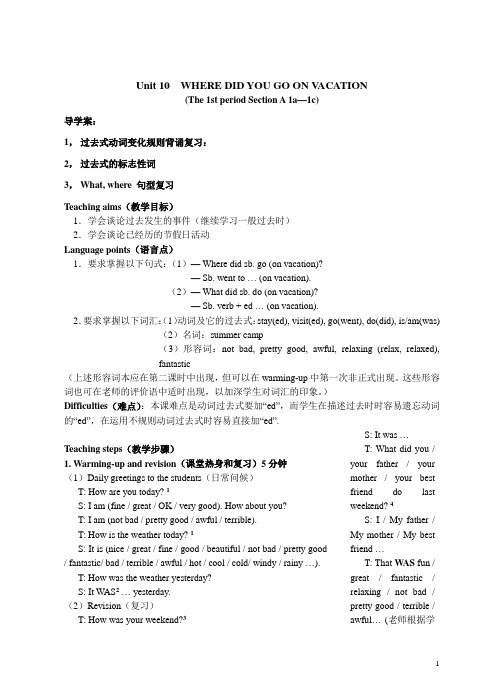
Unit 10 WHERE DID YOU GO ON V ACATION(The 1st period Section A 1a—1c)导学案:1,过去式动词变化规则背诵复习:2,过去式的标志性词3,What, where 句型复习Teaching aims(教学目标)1.学会谈论过去发生的事件(继续学习一般过去时)2.学会谈论已经历的节假日活动Language points(语言点)1.要求掌握以下句式:(1)— Where did sb. go (on vacation)?— Sb. went to … (on vacation).(2)— What did sb. do (on vacation)?— Sb. verb + ed … (on vacation).2.要求掌握以下词汇:(1)动词及它的过去式:stay(ed), visit(ed), go(went), do(did), is/am(was)(2)名词:summer camp(3)形容词:not bad, pretty good, awful, relaxing (relax, relaxed),fantastic(上述形容词本应在第二课时中出现,但可以在warming-up中第一次非正式出现。
这些形容词也可在老师的评价语中适时出现,以加深学生对词汇的印象。
)Difficulties(难点):本课难点是动词过去式要加“ed”,而学生在描述过去时时容易遗忘动词的“ed”,在运用不规则动词过去式时容易直接加“ed”.Teaching steps(教学步骤)1. Warming-up and revision(课堂热身和复习)5分钟(1)Daily greetings to the students(日常问候)T: How are you today? 1S: I am (fine / great / OK / very good). How about you?T: I am (not bad / pretty good / awful / terrible).T: How is the weather today? 1S: It is (nice / great / fine / good / beautiful / not bad / pretty good / fantastic/ bad / terrible / awful / hot / cool / cold/ windy / rainy …).T: How was the weather yesterday?S: It W AS2… yesterday.(2)Revision(复习)T: How was your weekend?3S: It was …T: What did you / your father / your mother / your best friend do last weekend? 4S: I / My father / My mother / My best friend …T: That W AS fun / great / fantastic / relaxing / not bad / pretty good / terrible / awful…(老师根据学生回答给出多种评价。
unit 10 where did you go on vacation (说课+实录+评课+说课稿

Unit 10 Where did you go on vacation? 说课稿青白江实验外国语学校蒲婷婷学情分析学生在第九单元已接触过一般过去时,具有了学习本单元知识的认知前提,能自然地与本单元话题进行衔接。
本堂课的话题—“假期活动”接近学生的生活,学生乐于谈,有话说。
教学内容Section A中2a. 2b. 2c. Grammar focus教学目标知识与能力1.The vocabulary:New York City,Central Park,exam.2. Master and use target language:Where did you/ they /he / she go on vacation?I / They /He /She went to the mountains\New York City\beach\summercamp.Did you go to the beach?Yes,I did.No, I didn’t.How was your vacation? It was nice.情感态度价值观学会用一般过去时进行信息交流,培养学生的环保意识,热爱大自然。
教学重、难点及教学突破重点l. The vocabulary:New York City, Central Park,exam.2. Language:Where did you/they/he/she go on vacation? I/They/He/She went to the mountains/ New York City/ beach /summer campDid you go to the beach? Yes,I did. No, I didn’t.How was your vacation? It was nice.难点e the target language to talk about past events.2.一般疑问句3.Listening教学突破1.对于本课的单词短语通过图片来引出并学习。
unit 10《where did you go on vacation》第一课时课件(人教新目标七年级下)ppt.pptx

Tina
Xiang Hua
Brad
Tom
Sally
Tina
A
Xiang Hua
B
Sally
C
Brad
D
Tom
E
Yes, she did.
Did Tina go to the mountains? Yes, she did .
Did Brad go to the beach on vacation? No, he didn’t. He visited his uncle.
with the pictures[a-g]
e 1.stayed at home __
2. went to New York
city __b__
3. visited my uncle
___d__
4. went to summer
c camp _____
5. went to the
a mountains ____
Julie go on vacation? Match the person with the place.
People Places
1. c Nancy a. the beach
2. a Kevin b. home
3. b Julie
c. New York City
a guide
2b Listen again. For each question check (√)
6. went to the
f beach_____
7. visited
g museums______
PAIRWORK :
Where did he/she/they go on vacation ? He / She /They …
Unit-10-Where-did-you-go-on-vacation教学演示

the Great Wall
the Palace Museum
Where did my friends go on vacation?
Tian’an Men Square
a Beijing Hutong
Task 2 My classmates’ vacation
Listen to Vera talking about her vacation. Where did Vera go on vacation? Did Vera like her vacation?
Jim
… …
…
Task 3 Decide on next vacation destination.
• I decided to go to Hong Kong. • Mary went there last summer vacation.
The weather there was sunny, warm and humid. The food was delicious. I love it. • I think it was very great. • So I want to go there next vacation.
Unit 10 Where did you go on vacation?
Leading in
Listen and answer: • What did they talk about? • What did they do on vacation?
Task 1 Talk about your vacation activities.
Listening
What does Vera think about?
UNIT 10 where did you go on vacation?

1.你去哪里度假了? Where did you go on vacation? 2.我去海边了. I went to beach. 3. 3.我去故宫博物院了. I went to the Palace Museum. 4.我去万里长城了. I went to the Great wall. 5.我看望我的叔叔了. I visited my uncle.
Where did you go on vacation?
Songshan middle school
stayed at home
visited my uncle
went to New York City
went to the mountains
went to summer camp
went to the beach
I went toFra biblioteksummer camp the beach a Beijing Hutong the Palace Museum the Great Wall
Where did you go on vacation? I visited my uncle. I visited museums. I stayed at home. I went to tian'an men square.
homework homework
�
a Beijing Hutong?
No, I didn't.
the Palace Museum?
No, I didn't.
the mountains summer camp the beach a Beijing Hutong the Palace Museum the Great Wall New York City
七年级英语-Unit_10_Where_did_you_go_on_vacationAqnAKP

Ⅰ.词汇1.呆在家里2.拜访我的叔叔3.去海滨4.夏令营5.在角落里6.帮助某人做某事7.从……到8.在晚餐的时间9.出来10.整天Ⅱ.单项选择1.We had great fun in the waves.A.playB.playingC.played2.He helped me my lost book.A.foundB.findC.finding3.The old song made me .A.smileB.to smileC.smiling4.We usually go to school Monday Friday.A.between;andB.from;tillC.from;and5.—May I go there by bike?—No,you .The weather is rainy.A.aren’tB.don’tC.can’t6.Every one an English story book.A.haveB.are havingC.has7.What did you have breakfast this morning?A.atB.forC.to8.Where did Vera go vacation?A.forB.inC.onⅢ.补全对话A:Hi,Lin.Long time not see.B:I my vacation.A:Really? did you go on vacation?B:I to the beach.A:How was the ?B: hot and humid.A: you swim?B:Yes,I did.The weather was really warm.What about you? was your vacation?A:It’s .I went nowhere.I at home.附参考答案:Ⅰ.1.stay at home 2.visit my uncle 3.go to the beach 4.summer camp 5.in the corner 6.help sb. do sth. 7.from…to…8.at supper time e out 10.all day Ⅱ.1~4 BBAB 5~8 CCBCⅢ.went on,Where,went,weather,It’s,Did,How,boring,stayedⅠ.词汇1.Today the weather is very cool,so we (决定) to play tennis.2.I don’t like going shopping.It’s (拥挤) there.3.How was your (假期)?4.My father likes to take a bus (旅行).He thinks it’s relaxing.5.The people in Russia are really (友好的).6.It’s (多雨的) in summer.7.The mooncakes(月饼) with eggs in them are (美味的).8.She had great (困难) finding a job.9.At night,I listened to the sound of (波浪).10.I did pass my physics (考试).Ⅲ.句型转换1.My vacation was great!(对划线部分提问)was your vacation?2.I went to summer camp during my holiday.(对划线部分提问)you during your holiday?3.The weather was hot and humid.(对划线部分提问)was the weather?4.Ann went to the mountain by car.(对划线部分提问)Ann to the mountain?5.Tom was in the New York City last year.(改为一般疑问句)Tom in the New York City last year?Ⅲ.汉译英1.她假期去看她叔叔了。
unit 10 where did you go on vacation (说课+实录+评课+说课稿

People
1. 2. 3.
places a. went to the beach
Nancy c
Kevin ____ b. stayed at home a
Julie ____ b
c. went to New York City
需要更完整的资源请到 新世纪教 育网 -
She went to New York City. It was nice.
B: I went to the mountains.
A:How was your vacation? Went to New York city 需要更完整的资源请到 新世纪教 B:It was nice/OK/interesting/terrible .
需要更完整的资源请到 新世纪教 育网 -
Practice in pairs:
Did kevin… on vacation?
Yes, he did./ No, he didn’t.
Names Kevin Mary Lucy Nancy Tom Linda
go to the movies visit museums go to the beach study for exams
study for 需要更完整的资源请到 新世纪教 育网 - exams?
Central( 中心的 )
Central Park
需要更完整的资源请到 新世纪教 育网 -
exam
Study for exams
需要更完整的资源请到 新世纪教 育网 -
需要更完整的资源请到 新世纪教 育网 -
2b.Listen again.
Did you…
Nancy
Yes ,I did. No, I didn’t.
Unit_10_Where_did_you_go_on_vacation电子教案1
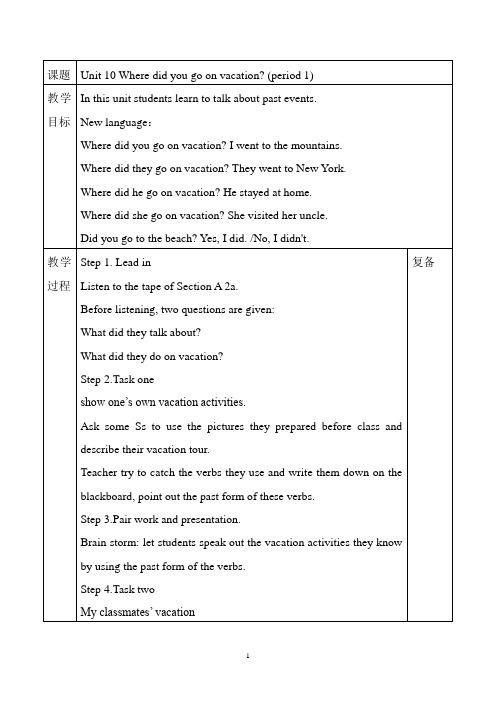
2. Review the difference between regular –ed past tense verbs (stay –stayed, visited).
Brain storm: let students speak out the vacation activities they know by using the past form of the verbs.
Step 4.Task two
My classmates’ vacation
Listen to the tape of Section B2a,ab.
step 5. Listening
This activity gives students practice in understanding the target language in spoken conversation.
The people talk about what they did on vacation.listen to the recording and write numbers of the names in the right boxes in the picture. Please write only 5 numbers. Point out the sample answer next to the picture showing went to the mountain.
Where did they go on vacation? They went to New York.
七年级英语下册:Unit 10 Where did you go on vacation重难点解析(
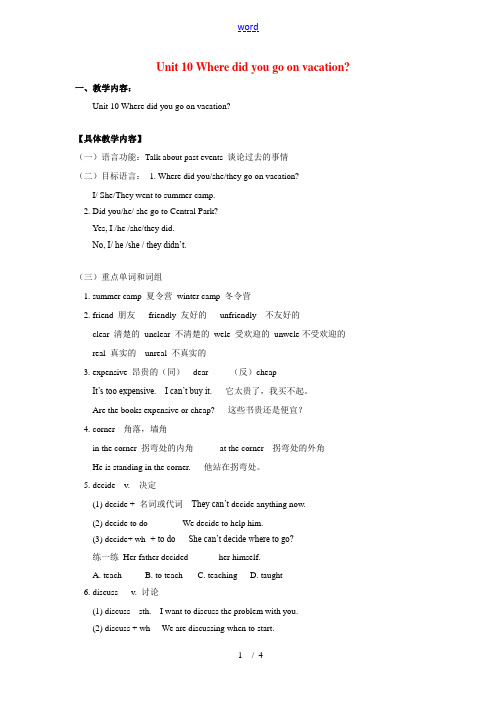
Unit 10 Where did you go on vacation?一、教学内容:Unit 10 Where did you go on vacation?【具体教学内容】(一)语言功能:Talk about past events 谈论过去的事情(二)目标语言:1. Where did you/she/they go on vacation?I/ She/They went to summer camp.2. Did you/he/ she go to Central Park?Yes, I /he /she/they did.No, I/ he /she / they didn’t.(三)重点单词和词组1. summer camp 夏令营winter camp 冬令营2. friend 朋友friendly 友好的unfriendly 不友好的clear 清楚的unclear 不清楚的wele 受欢迎的unwele不受欢迎的real 真实的unreal 不真实的3. expensive 昂贵的(同)dear (反)cheapIt’s too expensive. I can’t buy it. 它太贵了,我买不起。
Are the books expensive or cheap? 这些书贵还是便宜?4. corner 角落,墙角in the corner 拐弯处的内角at the corner 拐弯处的外角He is standing in the corner. 他站在拐弯处。
5. decide v. 决定(1) decide + 名词或代词They can’t decide anything now.(2) decide to do We decide to help him.(3) decide+ wh- + to do She can’t decide where to go?练一练Her father decided ______ her himself.A. teachB. to teachC. teachingD. taught6. discuss v. 讨论(1) discuss sth. I want to discuss the problem with you.(2) discuss + wh- We are discussing when to start.7. back adv. 回原处,往回去go back 回去 e back 回来n. 背部,后面,后部in/ at the back of…在……后面at the back of the house(反) in front of / in the front of8. the Great Wall 长城He who does not reach the Great Wall is not a true man.不到长城非好汉。
Unit-10-Where-did-you-go-on-vacation-Section-A--新目标

Where did you go on vacation?
visited museums
Where did Brad go on vacation? He visited his uncle.
Where did Tom go on vacation?
He went to summer camp.
Fill in the blanks in the conversation. Use “was” or “were”. Example: It was rainy. The mountains were beautiful.
Amy: How was your vacation, Lin? Amy: How
Where did Sally go on vacation?
She stayed at home.
Where did Tina go on vacation?
She went to the mountains.
Where did Xiang Hua go on vacation?
He went to New York City.
Did you … Nancy go to Central Park? Kevin
Yes, I did
No, I didn’t
√ √ √
play volleyball?
swim? go to the movies? study for exams?
Julie
√
√
GROUPWORK
Nancy, where did you go on vacation? I went to Now York City. Oh, really? Did you go to Central Park? Yes, I did.
Unit_10_Where_did_you_go_on_vacation说课稿2
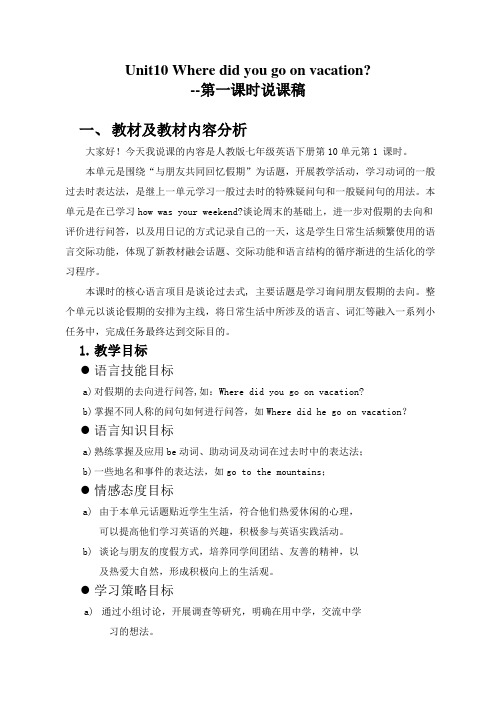
Unit10 Where did you go on vacation?--第一课时说课稿一、教材及教材内容分析大家好!今天我说课的内容是人教版七年级英语下册第10单元第1 课时。
本单元是围绕“与朋友共同回忆假期”为话题,开展教学活动,学习动词的一般过去时表达法,是继上一单元学习一般过去时的特殊疑问句和一般疑问句的用法。
本单元是在已学习how was your weekend?谈论周末的基础上,进一步对假期的去向和评价进行问答,以及用日记的方式记录自己的一天,这是学生日常生活频繁使用的语言交际功能,体现了新教材融会话题、交际功能和语言结构的循序渐进的生活化的学习程序。
本课时的核心语言项目是谈论过去式, 主要话题是学习询问朋友假期的去向。
整个单元以谈论假期的安排为主线,将日常生活中所涉及的语言、词汇等融入一系列小任务中,完成任务最终达到交际目的。
1.教学目标●语言技能目标a)对假期的去向进行问答,如:Where did you go on vacation?b)掌握不同人称的问句如何进行问答,如Where did he go on vacation?●语言知识目标a)熟练掌握及应用be动词、助动词及动词在过去时中的表达法;b)一些地名和事件的表达法,如go to the mountains;●情感态度目标a)由于本单元话题贴近学生生活,符合他们热爱休闲的心理,可以提高他们学习英语的兴趣,积极参与英语实践活动。
b)谈论与朋友的度假方式,培养同学间团结、友善的精神,以及热爱大自然,形成积极向上的生活观。
●学习策略目标a)通过小组讨论,开展调查等研究,明确在用中学,交流中学习的想法。
b)通过猜测,并大胆的表达,以学习新知识。
c)兴趣教学策略,其中包括游戏、表演、对话。
文化意识目标a)了解主要的度假方式b)用恰当的方式表达自己的感受c)在学习中寻找中西方度假差异,培养学生跨文化意识2.教学重难点1)教学重点Where did you/he/she/they go on vacation?I/he/she/they went to/stayed at…2)教学难点动词的一般过去时的肯定句,一般疑问句等形式。
Unit_10_Where_did_you_go_on_vacation说课稿

Unit 10 Where did you go on vacation? Section B 3a-4 说课稿Hello, everyone. I’m very pleased to have an opportunity to share some of my teaching ideas with you. The topic of this unit is Where did you go on vacation taken from Unit 10 in Go for it ( Grade Se ven students’ book 2). Today I will focus on the second period of Section B and I want to talk about the lesson from six parts.Part One: Analysis of the teaching material1. Status and functionIn Unit 10 we will continue to learn more about the Simple Past Tense and this period is mainly based on reading and writing which is a really important part in this unit. The students will be asked to have a further understanding about the tense after they have some proper practice. What’s more, the students are su pposed to not only master the grammar well, but also improve their abilities of reading and writing.2. Teaching aimsThere are three teaching aims in this period. First, students will learn to master some reading strategies. Next, students will infer the meanings of some new words while reading. Then, students will know how to write a travel diary. Finally, students will be able to express their own ideas about vacation.3. Teaching key points and difficultiesDuring this period the students need to master the key points below: First, review the Simple Past Tense and some adjectives learned in the last lesson. Second, Try to understand the whole passage by using some reading strategies. Third, learn to write a travel diary according to their own vacation. However, they will probably meet some difficulties. The teacher should pay more attention to the proper reading strategies, with which the students can find some important information in the passage.Part Two: Analysis of the studentsStudents of Grade Seven are interested in English and they would like to show their ideas to others, too. They prefer to talk about the things which are familiar in their daily life. More pictures and flashes can also help to raise their interest and make them more creative. The topic of Unit 10 is “vacation”, which is related to our daily life, so it is easy and helpful to raise the students’ learning interest. Most students will be able to talk about their ownvacations with the help of the teacher. Also they will be glad to share the ideas with their partners.Part Three: Teaching methods and reading strategiesIn this period, I’ll try to use these methods, such as communicative teaching method, task-based teaching method and audio-visual teaching method. While reading, I’l l help the students to understand the passsage by using centain reading strategies, such as scanning, reading for meaing not for details and so on.Teaching equipment: Multi-media computer, Tape recorder and the blackboard will be needed in this lesson.Part Four: Teaching ProceduresStep One: Lead-inGreeting and self-introductionArouse the students’ interest by showing them some photos about my 3-day vacation in Hangzhou during Spring Festival.1. Ask the students to describe the photos by using the adjectives they learned before.(Purpose: Help the students to review these adjectives and the target language “ How was/ were…?)2. Show my travel diary to the students.(Purpose: Let the students know what a travel diary is.)Step Two: Reading1. Read Bob’s travel diary and answer this question: It was a ___-day vacation.(Purpose: Students are supposed to find the useful information “the date”.)2. Read the diary again and find the adjectives.(Purpose: The students are supposed to find the adjectives and put them into different blanks.)3. Read a third time and fill in the chart.(Purpose: The students are supposed to find the supporting details while reading. )4. Fill in the blanks.I had a _____-day vacation. On the first day, it was _____ and _____ all day. We went to a beautiful _____ and had fun playing in the _____. Then we went shopping, but the shops were _____. On _____, we went to a _____ because it was _____. I found a small boy _____ in the _____. He was lost and I helped him _____ his father. That _____ me _____ very happy. I _____ _____ to the hotel because I didn’t have any money for a taxi. On the last day, we _____ to play tennis and it was fun. We had Sichuan food for dinner and it was _____.(Purpose: The students are supposed to retell Bob’s travel diary by completing the passage after understanding the whole story.)Step Three: Discussion and Writing1. Introduce some places of interest in Beijing.T: China is more and more popular all over the world and many foreign visitors come to visit China. Beijing is the capital of China and there are many places of interest there.(Purpose: The students are supposed to know some places, such as the Great Wall, the Palace Museum, Tian’an Men Square and Beijing Hutong,)2. Role play: Interview a foreign visitor.One student is supposed to be an American student who is on vacation in China and the other student plays a reporter from CCTV. Then make a conversation like this:(Purpose: The students are supposed to make a comversation to go over those target languages, such as “ what”, “where”, “how” and so on. And they can also discuss with each other about how wo describe these famous places. )3. Writing: Learn to write a travel diary.The teacher can give some key words and then let the students choose two of the pictures and try to write a travel diary as an American student.(Purpose: First, the students use the Simple Past Tense to make a conversation. The, Change the oral practice into written exercise. Based on the discussion ahead, it will be easier for the students to write a travel diary. In this way, every student can improve their speaking and writing abilities.)4. Composition appraise(Purpose: Revise some studen ts’ diaries and correct some mistakes.)Step Four: Homework: Write a travel diary about your 2-day vacation.Part Five: Design of the blackboard1. Title: Unit 10 Where did you go on vacation? Section B 3a-42. Some new words: cry—cries, make—made, feel—felt, water, corner, walk, decide, back3. Some places of interest: the Great Wall, the Palace Museum, Tian’an Men Square, Beijing Hutong Part Six: Reflection1. I want to raise the students’ interest, so I made the lesson begin with my own traveling experience and choose a famous city—Hangzhou.2. I want to make the reading easier for the students, so I planned some stratified questions and also use different forms.3. I want the writing to seem easy for the students, so I gave them a model and let them makea conversation first.4. I want to improve the students’ speaking, listening, reading and writing abilities, so I designed some relevant practice in this lesson.5. I want the students to use the language more often in their daily life, so I left a writing homework to them and wanted them to talk more about themselves.。
安徽凤阳县凤阳二中七年级英语下册 第十单元 词汇和句型精讲 人教新目标版

Unit 10 Where did you go on vacation? Vocabulary1.camp .露营地;露营,夏令营1)在日落时,我们到达了露营地。
We got back to camp at sunset.2)汤姆这个暑假要参加山区的夏令营。
Tom will go to summer camp in the mountains this summer vacation.(summer camp前常不加冠词)go camping 去野营3)你知道我们要去哪里野营吗?Do you know where we will go camping?2.exam .考试;测试1)你们什么时候参加期末考试?When do you take your final exams?2)下周我要去做一个眼部检查。
I will have an eye exam next week.have / take an exam 参加考试/检查exam是examination的缩略形式。
exam--- test---quizvt. 测试,检查3)医生给他做了个仔细的检查。
The doctor examined him carefully.=The doctor gave him a careful examination.4)警方检查房间试图找到指纹。
The police examined the room for fingerprints.examiner . 测试者;检查者3.crowd . 一群人a crowd of …一群…1)一群人在大门口等候。
A crowd of people are waiting at the gate.crowds of …许许多多…2)公园里有许多人。
There were / are crowds of people in the park.vt &vi. 挤,拥挤3)学生们围在教授的旁边。
Unit 10 Where did you go on vacation1

Unit 10 Where did you go on vacation一、单词:1. 名词:camp(summer camp); museum; guide; exam; water; corner; report; activity; classmate; sex2. 动词:make― made; cry ― cried; feel ― felt; decide ― decided; discuss ― discussed lose ― lost; leave-left; break-broke; find -found3. 形容词:central; rainy; fantastic; friendly ― unfriendly(un-为否定前缀);awful; delicious; expensive = dear ― inexpensive = cheap(in-为否定前缀); crowded ― uncrowded;4. 4. 副词:back (come/ go/ get/ give/ bring/ take…back)二、有用短语:1. stay at home =be in;2. on vacation3. 1).go to + 地点(eg: go to New York city/ the beach/ summer camp/ the mountains/ Central Park)2). go的固定搭配:go to bed;go to a movie = go to the movies; go +V-ing3). go home/there/here (here/there/home为地点副词)4. visit sb./ some place( eg: visit my uncle/ museums)5. all day/ night/ week/ summer/ year…6. have (great/ a lot of ) fun doing sth. eg: We can have fun in learning English.7. find sb. doing sth. 发现某人正在做某事eg: I found her reading in the classroom.(其它类似的短语see/ watch sb. doing sth. 看见某人正在做某事; see/ watch sb. do sth. 看见某人做了某事)8. in the corner表示在屋里或其它封闭区域里的角落;at/ on the corner表示在街上或开阔区域的拐角处9. get/ be lost 迷路10. help sb. (to) do sth. 帮助某人做某事eg: Let me help you (to) find it.13. make sb. do sth.使(让)某人做某事eg: They make him work twelve hours a day.14. walk back走回; come back回来; get back取回; go back回来; give back归还; bring back 带回来15. decide to do sth. 决定做某事eg: He decided to buy a new dictionary.16. the Great Wall; the Palace Museum ; Tian’an Men Squa re三、有用句型:1.― Whe re did you/ he/ she/ it/ they go on vacation?― I/ We/ He/ She/ It/ They went to……2.― Did you/ he/ she/ it/ they go to…― Yes, I/ we/ he/ she/ it/ they did. // No, I/ we/ he/ she/ it/ they didn’t.3. ― How was the weather? ― It was hot/ cool/ humid……4. ― How were the people? ― They were friendly/ unfriendly.5. We had great fun playing in the water.6. The shops were too crowded.7. I found a small boy crying in the corner.8. He was lost and I helped him find his father.9. That made me feel very happy.10. I didn’t have any money for a taxi. = I had no money for a taxi. (not any = no)11. We decided to play tennis.四、语法:(详见Unit 9)能力测试一、单项选择。
unit 10 where did you go on vacation 教案(人教新目标七年级) (6)
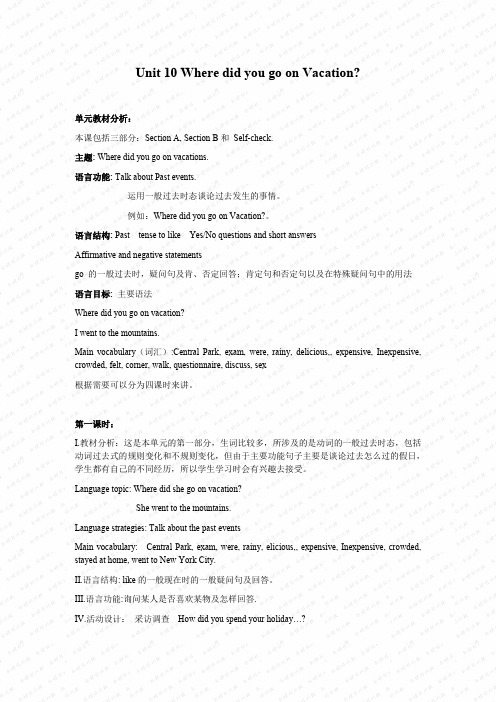
Unit 10 Where did you go on Vacation?单元教材分析:本课包括三部分:Section A, Section B和Self-check.主题: Where did you go on vacations.语言功能: Talk about Past events.运用一般过去时态谈论过去发生的事情。
例如:Where did you go on Vacation?。
语言结构: Past tense to like Yes/No questions and short answersAffirmative and negative statementsgo 的一般过去时,疑问句及肯、否定回答;肯定句和否定句以及在特殊疑问句中的用法语言目标:主要语法Where did you go on vacation?I went to the mountains.Main vocabulary(词汇):Central Park, exam, were, rainy, delicious,, expensive, Inexpensive, crowded, felt, corner, walk, questionnaire, discuss, sex根据需要可以分为四课时来讲。
第一课时:I.教材分析:这是本单元的第一部分,生词比较多,所涉及的是动词的一般过去时态,包括动词过去式的规则变化和不规则变化,但由于主要功能句子主要是谈论过去怎么过的假日,学生都有自己的不同经历,所以学生学习时会有兴趣去接受。
Language topic: Where did she go on vacation?She went to the mountains.Language strategies: Talk about the past eventsMain vocabulary: Central Park, exam, were, rainy, elicious,, expensive, Inexpensive, crowded, stayed at home, went to New York City.II.语言结构: like的一般现在时的一般疑问句及回答。
Unit10-Where-did-you-go-on-vacation英文说课稿

Unit10 Where did you go on vacation?Good morning, ladies and gentlemen. My name is Deng Qianzhen。
I am a junior student from School of Foreign Languages of Gannan Normal University。
I have learnt the necessities of being a teacher, including knowledge and teaching skills。
Today,I will talk about Unit10Wheredid you go on vacation? Go for it Junior English Book. There are six periods to finish this unit。
I will talk about the first period with the following ten parts。
I.Teaching philosophy:According to the New English Curriculum Criterion, teacher should play as a guider and let the students play a more important role in class。
So I design this class with the purpose to let the students be the center of the class。
As the students are junior students,so this lesson will be more focused on the students' ability of communication such as speaking and listening。
Unit 10 Where did you go on vacation全英文

Unit 10 Where did you go on vacation?(Section B 3a-4)一.Analyzing teaching materialLesson type: reading. We should put the emphasis on reading and writing.The reading material is focused on travel diary and the functional items are narration and descri ption . It’s helpful to improve students’ reading and writing ability.二.Teaching aims and demands(1)Knowledge objectsa. Enable the students to master the new words and phrases:water, cry, corner, make, feel, walk, back, decide, wall, palace, square, have fun doing, find sb.doing, be lost, make sb. Do, decide to dob. Get the Ss to be more familiar with the sentence patterns:It was ---, I went to---/visited--- I was ---(2)Ability objectsa. Enable the students to make a dialogue about traveling.b. Develop the students’ reading ability about a diary, and let themknow how many parts there are in a diary.c. After reading and analyzing the diary, enable the students to writea similar diary.(3)Moral objectsa. Arouse the students’ interest in learning English.b. Help them understand the background of travelingc. Activate their emotion to our great motherland, make them love ourcountry and hometown.三.Teaching importancea. The new words and phrases.b. Improve their reading skills and writing skills四.Teaching difficultiesa. Functional items: narration and description.b. Make students learn to write after reading五.Teaching procedures1.Warming upa. Show pictures about traveling and ask questions.Where did I go? How was the weather/food/---?b. Ask and answerT: Where did you go on vacation?S: I went to ----/ visited ---T: Did you ---?S: Yes/ No, I ----( This part will take about 5 minutes. The pictures may arouse students’ interest. ‘Ask and answer’ part can help students review the phrases of past tense and the sentences. What’s more, most students will open their mouse and it will be a good beginning.)2.RevisionPairwork.( make a dialogue)- Where did you go on vacation?- I went to summer camp.- How was the weather?-It was sunny and hot.- How was the food?- It was delicious.-…..-…..( This part, I use the communicative approach. The aim is to let the students practise the sentence patterns of narration and description. They are the foundation of reading and writing.3.Reading(1)Pre-readingBob : likes swimming, always has great fun playing in the water, likes helping other people, because it makes him feel happy.Lily : Bob’s sister, 13 years old, isn’t brave, people usually find her crying.(3a are Bob’s three diaries. I use situation approach. Suppose Bob and Lily are my friends from Australia, their activities can be the main line of the lesson. And from this part, some new words and phrases are presented. Students can learn them before reading.)(2)While- reading(3a)First time: listen and judge T or F.On Monday, Bob went to a beautiful park.( )The shop was very crowded, so Bob didn’t enjoy it. ( )On Tuesday, Bob went back to the hotel by taxi.( )It was very interesting in the museum.( )Sichuan food was very delicious.( )Second time: fast- reading. Read quickly and guess the meanings of some new words.•corner A 大街B街角,墙角•be lost A丢失B迷路•decide A决定B计划 (decide to do)Third time: carefully reading. Read the diaries one by one, then find the imformation and fill in the chart.( This part is very important, so ,it will take about ten minutes. I use task-based teaching method. The three tasks are more and more difficult. First, they know the content of the diaries. Next, they learn the new words. At last, they know clearly about the diary. And the chart also can help students master the structure of a diary.)(3)Post – readingRead again and make a conclusionThe structure of the diary:a. dateb. weatherc. activitiesd. feelings ( description words)( this part is the preparation of the writing part. We get the structure and the functional items from reading part.)4.Writinga. Show pictures about places Lily visited (3b), then teach the newwords:the Great Wall, the Palace Museum, Tian’an Men Square, a Beijing Hutong.Then ,complete Lily’s diary.(周四), August 1stToday is sunny, I went to the ,(长城) . We had great (乐趣) (参观) it. I saw many people there. Then, inthe afternoon, I went to Tian’an Men Square. There are many flowersin front of it. The square was very (大的). After dinner,I (乘) a taxi (返回) to the hotel. I wasvery (高兴) today.b. Write a diaryLily invites(邀请) you to Australia and you traveled in Sydney forseveral days.Today, you visited a zoo. Now, watch a video about yourtravel , then write a diary according to the video.( There are two tasks in this part. The purpose of the first task is tomake writing more easier. It is also an example of a diary. The secondtask is more important. I also use situation approach. To watch a videoabout traveling in Sydney is to make a real situation. Students can writewhat they saw and how they felt. It’s helpful. And from reading to writing,I also use 3P teaching method to help students write the diary.)5. Summary6. Homeworka. Listen and read 3ab. Write a diary。
七年级英语新目标下册unit10 Where did you go on vacation

nfriendly 8.The dog didn’t let me in. It was u________to me. oney 9.I didn’t have any m_______ for a taxi, so I walked back to the hotel. playing 10.We had great fun __________(play) football. to go 11.Jim decided ____________(go) to Shanghai. 12.Mary found her brother ________(sit) in the sitting corner. (to) find 13.Let me help you ________(find) him. 14.Her story made us _________(feel) sad. feel
了
3.make sb. do sth. 让/使某人干某事 The movie makes me relaxing. 4.let / have sb. do sth. do前不带to. Let the boy do his homework alone . 5.feel+ adj. 感到... I feel hungry / tired /happy / excited 6.decide to do sth. 决定干某事 They decided to go to Hainan on vacation .
我们学英语有很多乐趣 . 2. find sb. doing sth. 发现某人在干某事 . find sb. do sth. 发现某人干过某事 I find him reading the novel (小说).我看见 小说) 小说 我看见
Unit-10-where-did-you-go-on-vacation

2. be lost
3. help sb. do sth.
丢失,失踪, 迷路
帮助某人做某事
4. make sb. do sth.
5. decide to do sth.
使得某人……
决定去做某事
6. till
直到……
2. Read about Maria’s vacation. Then circle the correct answers.
Wednesday, July 17th Today the weather was cool, so we decided to play tennis. We played all morning.It was really fun. We had Sichuan food for dinner. It was delicious!
at the words and the faces in the box. Then ask and answer, make a short conversation.
Great!
Delicious! Crowded! Interesting!
Expensive! Friendly!
3. 用所给词编对话。
She went to the mountains. He went to New York City. She stayed at home. He visited his uncle.
4. Fill in the blanks in the conversation. Use “was” or “were”.
Maria had a wonderful vacation. She went to Hawaii. Maria likes fruit, and the Hawaiian bananas and oranges were great.The weather was very good, too. On Monday she went to the beach and visited four museums. The museums were interesting and not very crowded. On Tuesday she went to the mountains. On Wednesday she visited an old friend. They went to the movies Wednesday evening.the movie was very funny. The vacation cost $5000, but Maria had a wonderful time.
- 1、下载文档前请自行甄别文档内容的完整性,平台不提供额外的编辑、内容补充、找答案等附加服务。
- 2、"仅部分预览"的文档,不可在线预览部分如存在完整性等问题,可反馈申请退款(可完整预览的文档不适用该条件!)。
- 3、如文档侵犯您的权益,请联系客服反馈,我们会尽快为您处理(人工客服工作时间:9:00-18:30)。
评课稿
今天,听了我校蒲婷婷老师的英语课《Where did you go on vacation》,纵观这节课,教学设计巧妙、安排合理、充分发挥多媒体教学手段、师生关系和谐、学生参与学习积极性高,取得了不错的教学效果。
下面,我就对这节课进行一下评课,说一说我的体会。
一、注重营造愉快、宽松、平等、和谐的课堂氛围
蒲婷婷老师教态自然、表情和蔼可亲、语调亲切自然,并不断的鼓励学生,给学生以勇气。
以无私的爱心、童心去包容学生,用甜甜的微笑去对待学生,与学生融为一体。
学生靠内生的情感动力推动知识的掌握和智力的发展,达到了很好的教学效果。
二、活动方式多样化
本节课蒲婷婷老师采用了pair work、group work、interview 、report 等一系列活动。
开展小组合作学习的好处很多,特别是在大班额教学中尤为明显。
首先能够注重学生自主学习和合作学习能力的培养,这是学生在校学习阶段发展的一个重要能力,
同时,合作学习的轻松环境可以降低焦虑,增强信心,促进人际交往。
这对学生的积极学习有很大好处,能提高大班额情况下的教学质量,学生在小组中顾虑较少,会大胆开口,不怕犯错,随时提问,比起严肃的课堂教学,学生更容易产生愉快感。
三、充分发挥现代化教学手段,为教学服务
蒲婷婷老师的这堂课中,几个部分教学都恰当地使用了多媒体课件。
多媒体课件具有鲜艳的颜色和丰富的动态画面,使得教学内容活泼生动,能够吸引学生的注意力,激发学生的兴趣,使学生身心愉快地掌握知识。
而且,在短短的四十分钟时间里,教师传授的知识相对丰富了,学生真正学得的知识也相应的增多了,大大地增加了课堂知识的容度,提高了课堂效率。
四、课堂教学设计理念新
以学生的发展为根本,运用任务型教学方式引导学生积极参与教学活动,在整个过程中实现师生,生生互动,活动内容丰富多彩,接近学生生活,在互动,交流,合作,探究中实施教学。
整个过程中教师的角色起了深刻的变化,真正成了组织者,参与者,引导者,帮助者,关注学生学习策略,学习方法,学习态度,成为名副其实的"以学为本"的教学设计,以课题为背景,任务型教学Learning by doing 的理念和思路清晣,课堂设计体现了一位优秀教师的先进理念与素质。
五、谈一谈本节课反映出来的一些问题
如果蒲老师能够在根据学生反映出来的情绪变化,不拘泥于事先准备好的教案,实时调控教学的进程、教学的内容,变换一下教学的方法,本节课的教学效益会更好。
当然,作为一个工作经验不足三年的青年教师,能发挥今天的教学水平,也确实不容易。
总之,蒲婷婷老师的这节英语课是一节比较成功的示范课,达到了预期的教学效果。
在以后的教学中,我们期望蒲婷婷老师能够再接再厉,争取更大的成绩。
